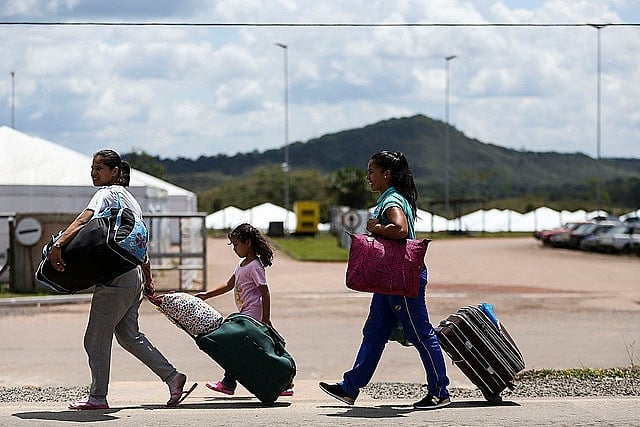Brazil was shocked earlier this month as residents of the northern city of Pacaraima, Roraima, attacked Venezuelan immigrants, when locals burned the migrants’ belongings and assaulted them. The town, with a population of approximately 10,000, is on the border of Brazil and Venezuela and has been witnessing a large flow of people fleeing from the political and economic crisis in the neighboring country.
Brasil de Fato spoke with psychoanalyst and sociologist Ana Gebrim, a specialist in immigration, to better understand the impacts of violence against those who leave their homes and try to live a more decent life in unknown territories. She also addresses Brazilians’ hatred and xenophobia and discusses how to cope with the feeling of rejection.
Gebrim argues that Brazil is experiencing similar processes as the incidents happening in Europe and the United States, which are also pushing harsher policies against immigration in recent years.
Read the interview:
Brasil de Fato: How can we understand this “phenomenon” that has been happening with Venezuelans?
Ana Gebrim: Working closely with people and watching their suffering, their narratives about being persecuted around the world, we are very concerned about this episode. The way the population has been dealing with this situation in Roraima [Brazilian state] is somehow a reflection of what is happening in Europe, in the Middle East, in some countries in Africa, where there is a policy rejecting and limiting the possibilities of poorer people to move around the world looking for better living conditions. So I am shocked at and concerned about the extreme xenophobia and violence against immigrants. It’s coming to Brazil very fiercely.
We’ve witnessed a situation this month in Pacaraima, state of Roraima, that drew a lot of attention because of the assault against Venezuelans. At least 1,200 Venezuelan immigrants have left Brazil after this episode. All this happened because of unconfirmed information about a robbery involving some of those immigrants. From a psychoanalysis viewpoint, what are the impacts of episodes like this on people who leave their home country?
These people come to Brazil looking for better living conditions – nothing more than just enough to live –, and to experience more violence, more rejection… We hear stories of people who are beaten, forcedly evicted, [living in] the worst possible conditions, and having to go back after experiencing that definitely has a huge subjective impact on them.
Now, what we are watching with great concern is that, somehow, this is a reflection of what is happening in European countries and in the United States, which is what I call the three great policies against immigrant people: the wall policy, the indifference policy, and necropolitics. The first one means countries have been increasingly creating border apparatus and provisions, limiting, creating barriers and deterrents so that people don’t come to the countries to where they want to migrate.
An indifference policy means that, even though the reality [of immigrants] is extensively depicted in the media – that is, we see the images of those people, we see how they are living –, that does not create any kind of change or any kind of engagement in civil society or the political narrative, or any kind of initiative to change this situation. It is as though the more reality is depicted, the more that creates almost like a numbness effect.
And third, intricately connected with the other narratives, there is necropolitics, an order of discourse that aims to make people’s lives poorer and poorer, leaving people with nearly walking-dead experiences. Absolutely limiting the possibility of having quality life in the sense of accessing basic human rights, the possibility of settling, moving around, getting basic goods – nearly everything is limited. So what we have been witnessing in Roraima has also been happening around Brazil and is a reflection of a global policy that turns immigrants into escape goats.
How to cope with the hatred that rises along with the rejection of immigrants?
First of all – which is a contribution from psychoanalysis – it is to think about how this evil, with its destructive potential, goes through us and is human. The contribution of that is to think that evil is not something that we have to purge, unlike a religious perspective that will try to remove what is evil from us. As we understand destructiveness or destructive potential as a complex component of subjectivity, we are more able to think about what to do with that, what we can do with hatred and with our inner war.
What we are witnessing today is reasonings that become action, mainly by people who say they are “good,” that is, it’s the evil embodied by those who claim to be good, who won’t acknowledge their own destructive potential. So, if we can think of ways out from a psychoanalysis viewpoint, it would be to reverse that reasoning. The more a citizen says they are good, the more evil they are doing. By acknowledging the evil that goes through us, we can deal with it differently.




